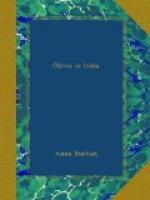Autolycus has knocked at the door to say “Master’s come” (he likes to be very European with me so doesn’t call him Sahib), and I must go to tea. To-morrow Boggley is taking the whole day off and we have got it all planned out, every minute of it. In the morning we shall drive in a tikka-gharry to the Stores to buy some final necessaries (such as soap and tooth-powder), then to Peliti’s to eat ices, then to the shop in Park Street so that Boggley may get me a delayed birthday present, then round and round the Maidan. Then we shall go to luncheon at the Townleys and go on with them to Tollygunge for golf. Then we are going to tea with some people who are taking us a motor run. Then we go to a farewell dinner at the Ormondes’. Then we shall go to bed.
Bless you, my dear.
S.S. Socotra, Homeward Bound, Somewhere in the Hoogly, April 24.
... This day seems to have been going on for weeks and it is only tea-time now. Was it only this morning that we left? I can’t think it was this morning that Boggley and I took our last chota-hazri together, and Boggley as he gloomily sugared his tea, said, “Now I know what a condemned man feels like on the morning of his execution.” Then we laughed and it wasn’t so bad. Autolycus, very important because the Miss Sahib was going to cross the Black Water, bustled about with my few packages (all the heavy baggage went away two days ago) and, finally, bustled us into a tikka-gharry in such good time that we had to drive twice round the Maidan before we went to the landing-stage. Dear, funny Autolycus! I shall miss his ugly, honest face. He has added greatly to the gaiety of nations as represented by Boggley and me. The last we saw of him was standing before the hotel door along with Bella and the two chuprassis bowing low and murmuring, “Salaam, Miss Sahib, salaam,” while I, undignified to the last, knelt on the seat and wildly waved a handkerchief.
The landing was crowded with people. I wondered how we were all to get on board one ship, but found as we got on to the launch that most of the people remained behind; they were only see-ers off. Mr. Townley had by some means managed to get permission for himself, his wife, and Boggley to go down the river with us in the launch to where the Socotra lay; which was a great comfort to us all. When we found our party, poor G.’s face was much less pink than usual. The Ormondes were there, having ridden down to see us off, and quite a lot of other people had come for the same reason. We (the passengers) had to be medically examined before we were allowed to leave—in case of plague, I suppose. G. and I were rather scared at the thought—how were we to know that we hadn’t plague lurking about us? However, after a very cursory glance we were passed on, got our good-byes said, and embarked on the launch. At any other time I would have hated saying good-bye to the Ormondes




